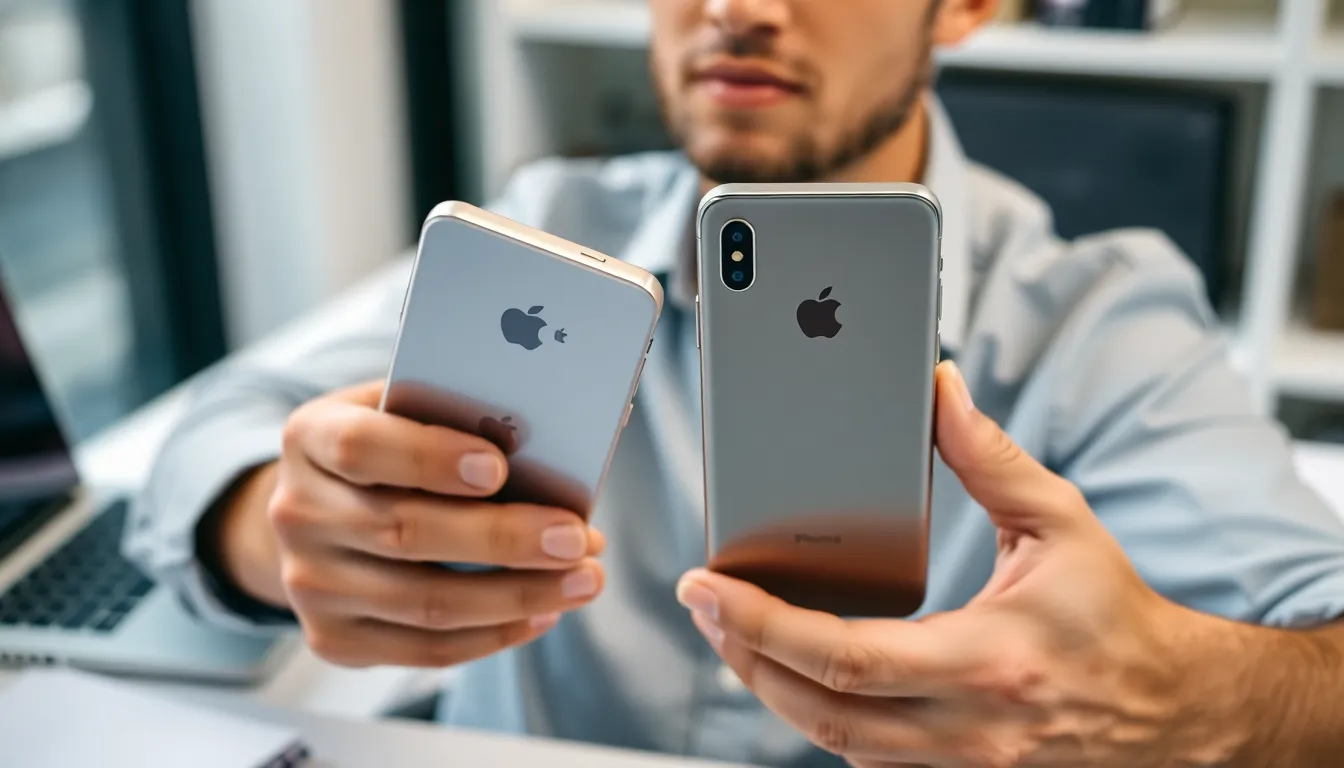Table of Contents
ToggleThinking about making the leap from iPhone to Samsung? You’re not alone. Millions have faced the same dilemma, weighed the pros and cons, and wondered if a shiny new Galaxy is worth the switch. After all, who wouldn’t want to explore a world of customization, expandable storage, and that glorious headphone jack?
Sure, iPhones are sleek and user-friendly, but Samsung’s got some tricks up its sleeve that might just make you reconsider your loyalty. From stunning displays to innovative features, switching could feel like trading in your trusty old bicycle for a high-speed motorcycle. So, buckle up as we dive into the fun and fabulous world of Samsung and help you decide if it’s time to break up with your iPhone.
Overview of the Apple vs. Samsung Debate
The debate between Apple and Samsung centers on user experience, innovation, and brand loyalty. iPhones demonstrate a straightforward interface that users often find intuitive. Conversely, Samsung devices boast extensive customization options, attracting users who prefer tailored settings.
Samsung offers features such as expandable storage and the headphone jack, which appeal to many users. On the other hand, iPhones present a seamless ecosystem for individuals already invested in Apple products. Both brands prioritize performance, but their approaches differ significantly.
Display quality represents another key factor. Samsung frequently incorporates vibrant AMOLED displays, enhancing media consumption experiences. Comparatively, Apple’s Retina displays provide sharp visuals with accurate color representation.
Price points reveal additional considerations. Samsung devices cover a broader price range, providing options for budget-conscious consumers. iPhones generally command a premium price, reflecting brand prestige and perceived value.
Software updates illustrate differing philosophies. Apple consistently delivers regular updates to all devices within a specific time frame. Samsung’s update schedule can vary by model, affecting user experience over time.
Both ecosystems provide robust app support, though some apps launch earlier on one platform than the other. Users often find exclusive features that may sway their decision, depending on their preferences. The ultimate choice between Apple and Samsung largely hinges on individual priorities, whether those relate to customization, ecosystem integration, or specific hardware features.
Key Factors to Consider

Switching from an iPhone to a Samsung device involves multiple important factors.
Operating System Differences
iOS and Android offer distinct user experiences. iOS emphasizes simplicity and seamless integration across Apple devices. Android provides extensive customization and flexibility, allowing users to tailor their devices. For those who prioritize a straightforward interface, iOS excels. Conversely, users interested in personalization may find Android appealing. App availability also differs, with some popular applications debuting on one platform ahead of the other. Consider how these elements influence daily usage and overall satisfaction.
Hardware and Design Comparisons
Samsung devices often showcase innovative hardware and design features. Many models come with vibrant AMOLED displays, enhancing video and photo experiences. Expandable storage is common in Samsung devices, unlike iPhones, where built-in storage options limit flexibility. Users often appreciate the diverse range of Samsung models that cater to varying preferences and budgets. Ergonomics can also differ; iPhones usually prioritize sleek design, whereas Samsung often incorporates practical elements like headphone jacks. Evaluate how these hardware choices align with personal usage habits and aesthetic preferences.
User Experience
User experience plays a critical role when considering a switch from iPhone to Samsung. Each platform offers distinct features that cater to different user preferences.
Interface Navigation
Navigation differs significantly between iOS and Android. iOS provides a consistent, intuitive design across devices that many find easy to use. Samsung’s One UI, however, enhances the Android experience with customizable options. Users can rearrange home screens, add widgets, and choose different themes. Samsung’s gesture controls offer another layer of flexibility, making for an engaging user interaction. The layout may feel more open compared to iOS, appealing to those who prefer personalization.
App Ecosystem
Both ecosystems boast extensive app availability, yet certain differences exist. Many popular apps launch first on iOS, ensuring a polished experience from the start. Samsung users benefit from the Google Play Store, which offers diverse applications catering to numerous needs. Compatibility also becomes crucial; many apps function seamlessly across devices within each ecosystem. However, specific features in some apps may vary between platforms, impacting user experience. Budget-conscious consumers may marvel at the range of options available on Samsung, providing solid alternatives at various price points.
Performance and Specifications
Performance and specifications greatly influence the decision to switch from an iPhone to a Samsung device. Users often prioritize camera quality and battery life when evaluating their options.
Camera Quality
Samsung smartphones frequently excel in camera capabilities. Many models feature higher megapixel counts, delivering detailed photos. Advanced night mode options enhance low-light photography significantly. Users appreciate the versatility offered by multiple lenses, including ultra-wide and telephoto. Apple’s iPhones also capture stunning images and deliver consistently vibrant colors. However, Samsung’s processing algorithms often yield more dynamic range and contrast in certain lighting conditions. For photography enthusiasts, this distinction can make a considerable difference in capturing life’s moments.
Battery Life
Battery life remains a crucial factor for many users considering a switch. Samsung devices typically include larger battery capacities compared to iPhones, accommodating extended usage. Models often achieve all-day battery life, performing well even under heavy use in multitasking scenarios. Fast charging technologies in Samsung devices allow for quicker power restoration, a significant plus for busy individuals. iPhones, while optimized for battery efficiency, may not match Samsung’s battery longevity in high-demand situations. Each brand offers unique charging solutions that cater to varying user needs, highlighting the importance of battery performance in daily life.
Cost and Value
Cost and value are crucial considerations when deciding whether to switch from an iPhone to a Samsung device. Samsung provides various options across different price points, making it accessible for budget-conscious consumers.
Pricing Comparison
Pricing between Samsung and iPhone shows significant differences. Most Samsung devices start at lower price points, catering to entry-level and mid-range markets. For example, Galaxy A series smartphones often retail between $200 and $500. Meanwhile, iPhones typically range from $699 for the base model up to over $1,100 for the latest flagship models. This pricing strategy allows Samsung to appeal to a more extensive user demographic. Furthermore, Samsung frequently offers promotional deals and trade-in programs to enhance affordability, which can significantly affect overall costs.
Resale Value
Resale value varies greatly between Samsung and iPhone devices. iPhones generally maintain higher resale value due to strong brand loyalty and demand in the second-hand market. Consumers often report resale values of about 60% or more after one year. Conversely, Samsung phones experience quicker depreciation, with some models losing up to 50% of their value in the same timeframe. Several factors contribute to this difference, including brand perception and perceived quality among consumers. Buyers should consider these resale values when evaluating long-term costs associated with their purchase.
Deciding whether to switch from an iPhone to a Samsung device involves weighing personal preferences and priorities. Samsung’s customization options and innovative features can be appealing for those seeking a more personalized experience. Meanwhile, iPhones offer a streamlined ecosystem that benefits users already invested in Apple products.
Ultimately the choice boils down to what matters most to the individual. Whether it’s camera quality battery life or budget considerations each factor plays a significant role in the decision-making process. By carefully evaluating these elements users can make an informed choice that aligns with their needs and lifestyle.




